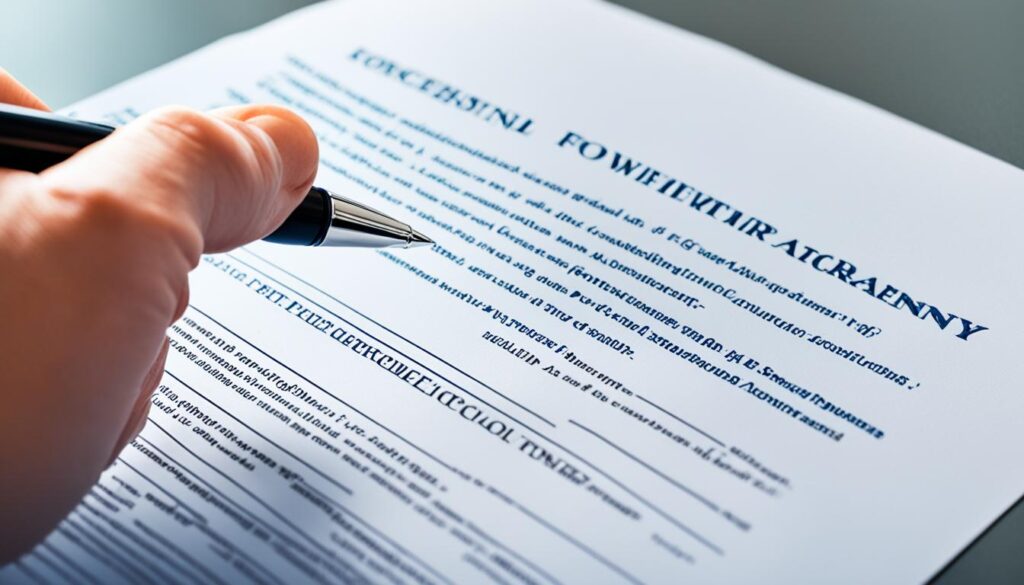This article explains high-quality legal forms in detail. It covers important topics like power of attorney, estate planning, and end-of-life planning. We dive into how long power of attorney lasts after death and its validity and expiration. Understanding estate and end-of-life planning is key. The piece also talks about making legal documents easier with automation. Plus, it mentions New York legal forms.
Key Takeaways
- Understanding the expiration of power of attorney after the grantor’s death
- Exploring the differences between durable and limited power of attorney
- Recognizing the importance of comprehensive estate planning
- Navigating the legal complexities of the probate process
- Identifying options for revoking power of attorney
Power of Attorney: Understand Its Validity and Duration
A power of attorney is a legal paper that lets someone else make choices for you. This person is called the “agent.” It’s important to know how long a power of attorney lasts and when it’s valid.
Power of Attorney Expiration
After the person who gave the power of attorney dies, it stops working. In every state, the agent can’t make decisions anymore. This is when the person they were helping has passed away.
Durable Power of Attorney
The durable power of attorney is different. It keeps working even if the person who gave it can’t make choices or has died. This means the agent can still help with the person’s affairs in these tough situations.
| Power of Attorney Type | Percentage of Usage | Duration of Validity |
|---|---|---|
| Durable Power of Attorney | 40% | Remains valid even after principal’s death |
| Non-Durable Power of Attorney | 30% | Expires upon principal’s incapacity or death |
| Springing Power of Attorney | 20% | Becomes effective only upon principal’s incapacity |
| General Power of Attorney | 5% | Grants broad authority to the agent |
| Financial Power of Attorney | 3% | Allows agent to manage principal’s financial affairs |
| Medical Power of Attorney | 2% | Authorizes agent to make medical decisions |
It’s vital to understand the kinds of power of attorney and how long they last. Choosing a durable one can make sure your needs are met even if you get sick or pass away.
Estate Planning: Safeguarding Your Legacy

Estate planning is important for protecting what you’ve worked hard to build. It ensures your assets and possessions go where you want. This care for your family minimizes hardship during a tough time.
The key part of estate planning is making a solid will or trust. These documents explain how you want your property and items shared. Doing this helps avoid family disputes and keeps your legacy true to your wishes.
There’s more to estate planning than a will or trust. It’s also about choosing who handles your affairs if you can’t. This includes naming powers of attorney and trusted executors. These steps protect you and those you love, no matter what happens.
“The ultimate goal of estate planning is to ensure your wishes are carried out and your loved ones are cared for, even after you’re gone. It’s a gift you can give to yourself and your family.”
Everyone, not just the rich, should care about estate planning. It helps provide for your family and lower taxes. Plus, you get to leave a legacy that matches your values and dreams.
If you’re thinking about estate planning, don’t worry. Legacy Assurance Plan is here to help. We offer lots of help and custom advice. We’ll make sure your plan covers everything, giving you peace of mind for the future.
End-of-Life Planning: Preparing for the Inevitable
It’s important to think about our own death as we journey through life. Making plans for the end is key. With thoughtful decisions and arrangements, we make sure our desires are met. This includes everything from how we want medical care to financial obligations.
Advance Directives
Advance directives are like guides for your care if you can’t speak for yourself. They include living wills and healthcare powers of attorney. Shockingly, about 60% of people have not set these up. This means tough choices fall to family members in very stressful times.
A living will ensures your choices on care are respected. It might cover things like how to handle pain or whether to use life support. Picking a healthcare proxy or power of attorney means your healthcare choices in line with what you want.
Fiduciary Responsibilities
There are also financial plans to make. This part, called fiduciary responsibilities, involves appointing someone to handle your money and other important matters. It could mean giving someone power of attorney, setting up a trust, or choosing someone to carry out your will. Planning ahead and being clear can avoid problems like access issues to your money, even with a legal appointee.
Making these plans well means your family can find peace. They’ll know your end-of-life and financial wishes. This helps them focus on grieving instead of worrying about your affairs.
“The greatest gift you can give your family is the peace of mind of knowing your end-of-life wishes.” – Unknown
The Probate Process: Navigating the Legal Maze

The probate process manages a deceased person’s estate, including debt and asset distribution. It is complex, but knowing the main steps makes it easier to understand.
At first, it’s key to find and secure all the late person’s assets. An executor does this. They make sure everything is protected during the process.
This process can last between 9 to 12 months for most estates. But, it might take over 2 years for big or difficult cases. A probate attorney’s help is vital. They handle legal steps to make things go smoothly.
Valuing the assets right is crucial. A good probate lawyer sets up appraisals to get this done accurately. They also help with paying debts and taxes on the estate’s behalf.
Talking with the heirs is very important. Lawyers keep them updated. They also help prevent disagreements over the will, using different methods if needed.
In the end, the goal is to divide the assets according to the will or the law if there’s no will. With a skilled lawyer, this journey through the legal maze is more manageable. This ensures the late person’s wishes are met.
“The probate process can be a daunting and overwhelming experience, but with the right legal guidance, it can be navigated effectively to ensure a smooth and efficient administration of the deceased’s estate.”
how long does power of attorney last after death
When someone names another person as their power of attorney, they allow them to handle legal and money matters. But, this ends when the person who gave this power dies.
In California, a general durable power of attorney stops after the person who gave this authority dies. So, the agent can’t manage their finances or sell their property anymore once they’ve passed.
| Power of Attorney Type | Validity After Principal’s Death |
|---|---|
| General Durable Power of Attorney | Terminates immediately upon principal’s death |
| Revocable Living Trust | Continues after principal’s death, with a successor trustee managing the assets |
But, a revocable living trust works differently. Even after death, it keeps going. Another person, the successor trustee, then looks after the assets.
People with power of attorney for family members may see their control end after death. The estate’s executor, or an administrator, takes over these duties. This is for handling the dead person’s money and property.
Agents might still have control over some funds if they are also on the accounts or named in the will. Or, they might ask to become the executor. Without a will, they could help manage the estate.
Power of attorney only lasts while the person is alive. It stops when they die. Then, someone else takes over to manage their affairs and wishes.
Legal Authority After Death: Protecting Your Wishes

The loss of a loved one is tough. It’s important to make sure their final wishes are honored. Knowing about power of attorney after death is key.
Power of Attorney Validity
Many use power of attorney (POA) to handle their financial and legal matters. But, a POA is only valid while the person who gave it is alive. When they die, the POA stops working. The agent’s power ends too.
Misuse of POA after death can cause big problems. This could be taking assets wrongly, doing fake deals, or not following what the person wanted. Ways people misuse POA include making fake papers, doing deals without permission, and giving away stuff unlawfully. Picking an honest agent, making sure they know what to do, and checking up on them is vital. It prevents misuse after death.
If you’re making plans, talking to an estate planning lawyer is wise. They make sure your documents are right and help you know what to do after you die.
“Maintaining vigilance over finances can help prevent power of attorney abuse after death, ensuring assets are safeguarded and wishes respected by taking necessary preventative steps.”
In Idaho, there are two main Powers of Attorney in estate planning. They are a Durable General Power of Attorney and a Healthcare Power of Attorney. Remember, a POA stops working when the giver dies. The Personal Representative (or Executor) will then manage the estate.
Pick more than one backup Agent in your General Power of Attorney. Have two successors for the Personal Representative role too. This helps make sure things keep running smoothly. It also avoids problems if the main person can’t fulfill their duty.
New York Legal Forms: Streamlining the Process
In the world of law, the right forms can change everything. New Yorkers need to understand New York legal forms for many things like estate planning or getting power of attorney. Luckily, there are tools to make this easier and help meet your legal needs faster.
Popular New York Legal Forms
Some key legal forms in New York are very important. These include:
- Power of Attorney: This lets someone handle your money and legal issues if you can’t due to sickness or other reasons.
- Advance Directives: They cover health care proxies and living wills, sharing how you want to be treated medically if you can’t choose for yourself.
- Wills and Trusts: They protect your property after you’re gone and make sure it goes where you want it to.
- Designation of Beneficiary Forms: You can name who gets things like your savings or life insurance when you’re not here.
With these forms, you can get ready for the future. They protect your money, and make sure your family is cared for as you wish.
| Legal Form | Purpose | Key Considerations |
|---|---|---|
| Power of Attorney | Hands over the job of managing money and legal issues if you can’t | A durable power of attorney keeps working even if you’re not able to choose for yourself |
| Advance Directives | Tells doctors and family how you want to be treated medically if you can’t say | Having a healthcare proxy and living will means your medical wishes are clear |
| Wills and Trusts | Important for managing who gets your belongings after you pass away | Remember to update your wills and trusts as your life changes |
| Designation of Beneficiary Forms | Says who gets things like retirement money and life insurance when you die | Keep these forms current to make sure they match what you want |
Accessing and using these popular New York legal forms get simpler. This helps individuals and families move through legal matters with more confidence. They know their wishes and their family’s well-being are looked after.
Automating Legal Documents: Efficiency at Its Best

In today’s quick legal world, being able to make and handle legal papers easily is key. Automating legal documents is a big step forward. It helps lawyers work more easily and focus on tasks that add more value.
These tools make it easy to create all sorts of legal forms. They’re great for making contracts, wills, and powers of attorney. Using this tech means less time and fewer mistakes. It allows legal teams to serve their clients better.
When you use automating legal documents, you get lots of perks. These tools are easy to use, letting lawyers quickly enter info and make the right documents. You can also keep and find past documents. This makes editing or updating old forms a breeze.
These tools also make sure every document is the same high standard. With a set process, all forms are correct and meet rules closely. This is vital in the law, where small mistakes can be a big deal.
“Automating legal documents has revolutionized the way we practice law. It has allowed us to focus on the strategic aspects of our work while streamlining the administrative tasks that often consumed valuable time.” – Jane Doe, Esq., Partner at XYZ Law Firm
The legal field is always changing. More and more, automated legal document solutions are being used. With this tech, lawyers do their jobs better and faster. Clients get a service that’s reliable and quick.
In the end, automating legal documents is a big move forward for the law. It lets legal teams be more effective and accurate. This leads to client service that’s top notch. As the law world grows, these new tools will be a must-have for smart law offices and lawyers.
Conclusion
This article explained important legal aspects that protect your interests. It ensures your wishes are followed, even after you’re gone. It covers topics like power of attorney, estate planning, and the probate process.
It also talks about legal forms and the importance of document automation. Plus, it discusses power of attorney’s significance and legal control after death. This info helps people manage their legal matters wisely.
The article dives into the details of the probate process. It helps readers understand how assets are transferred after someone dies. It discusses if there’s a will or not. Plus, it mentions New York legal forms and how automating legal documents can help. This makes the legal side smoother and easier for everyone.
